人教部编版初中英语中考78个易混易错单词短语句型梳理
人教版初中英语易混淆单词短语总结

vocabulary n. (可数名)by mistake地word n.;by accident有时地,不测处aloud adv. 作声地;大声地comma n.逗号(非常,反: quietly;silently)period n.句号loudly adv. 大声地;吵地question mark n. 号loud adv. 响亮地adj. 喧的;响亮的challenge n.挑 ( 复数 challenges)vt.挑pronounce vt . 拼;音pronunciation n. 音法;拼法specific adj.明确的;详细的specifi cally adv. 明确地;详细地special adj.特别的;特的specially adv. 地;特地especially adv. 特;特别;分外particular adj.非一般的;特的;特别的particularly adv. 特别;特地;特别地memorize vt.起来;熟;回起memorization n. ;回grammar n. 法grammatically adv. 法地;从法角度来,add A to B把A增添/充到B中add up to +数目达到⋯spoken English英口make a mistake = make mistakes solution.n. 解决方案;解答solve v. 解决later adv. 此后;一会此后late adj .晚;adv. 晚;lately adv. 近来;近来latest adj.最新的realize v.意到;(某人)(梦想)Eg: Finally, Kelsy realized her dream.come true (某人的梦想)Eg: Finally, her dream came true.matter vi.起重要作用;要Eg: I know Charles doesn't think this project is important, but it matters to me.afraid = terrified adj.惧怕的;愁的be afraid of ... = be terrified of ⋯恐惧 / 惧怕⋯be afraid to do = be terrified to do恐惧/惧怕做⋯laugh at⋯= make fun of⋯讥笑/嘲讽⋯complete vt.达成adj.完好的;完好的completely adv 完好地childhood n. 童年on duty班;日break off忽然中断;中断break down抛;出缺点break up分手take a ride兜take care小心,注意;珍重sb.be sure of sth.sb. be sure to do sth.sb. Be sure that⋯it is certain(无疑;确立) thatcertain adj.某,某些,某个Eg:friendly的比是friendlier,最高是friendliestcomic n.漫画,画志patient adj.耐心的n.病人patiently adv. 耐心地at the end of⋯in the endtake pride in⋯= be proud of⋯with pleasure能够用来答方的求,Eg: “Would you mind holding the door open forme, please ” “Oh, with pleasure.”It ’ s a pleasure.或It’s my pleasure.是用往返答感的答。
[全]人教版七八九年级英语常考易混短语
![[全]人教版七八九年级英语常考易混短语](https://img.taocdn.com/s3/m/768d12910722192e4436f654.png)
人教版七八九年级英语常考易混短语一.make的短语1. make friends 结交朋友2. make a wish 许愿3. make (one’s)bed 铺床4. Make up 编造故事,编造谎言5. Make sure 确保,查明6.Make promises 许诺7.Make (a lot of ) money 赚许多钱8.Make mistakes 犯错误9.Make a difference 影响,起作用10.make one’s way 前进;费力地前进11.make one’s own decision 自己做决定12.make an effort 做出努力13.make......feel at home 使某人感到宾至如归14.make a mess 弄得一团糟(一塌糊涂)二.take1. take a shower 洗淋浴2.take a walk 散步;走一走3.take the train/bus 乘火车/公共汽车4.take a message 捎个口信,传话5.take a photo of 给。
照相6. take one’s order 点菜7.Take ......seriously 认真对待8.Take sb’s place 代替,替换9.Take up (尤指为消遣)学着做,开始做10.Take out 拿出,带出11.Take a trip 去旅行12.Take one’s temperature 量体温13.Take breaks (take a break) 休息14.Take risks(take a risk) 冒险15.Take after (外貌或行为)像16.take out the rubbish 倒垃圾17.Take care of 照顾,处理18.take in 吸入,吞入(体内)19.take down 拆除,往下拽,记录20.take notes 记笔记21.take pride in 为。
中考英语专题复习 词汇句型易混易错知识点汇编 人教新目标版

词汇句型易混易错知识点汇编学案1.It’s said that he is a good student 据说It’s believed that 据相信It’s reported that 据认为2.within the year 在一年之内3.to this day 直到今天4.check in V. 登记住宿手续check-in n. 登记住宿手续check out v. 登记退宿手续check-out n. 登记退宿手续checkout n. 收款台5. a check – up on eyesight6.after all 毕竟7.There are three windows in the wall8.have a word with sb. = talk with sb.和某人说句话have words with sb. 和某人吵架9.The girl asked someone else to take a picture= The girl had a picture taken. 让某事被做10.You’ll be late for school if you don’t hurry.= Hurry up, or you’ll be late for school.=You won’t be late for school unless you hurry up. 11.be worth doing 值得做某事=be worthy of being done=be worthy to be done12.(1) Pleased to meet you.(2) I’m pleased to meet you.with you work.(3) What pleasant weather!(4) do sth. with pleasure 乐意做某事(5)Thanks a lot.It is a pleasure. (不用谢)14. go bad 变坏wrong 出错15.think of sb. as 把。
中考英语重点易混淆短语总结精华(推荐)
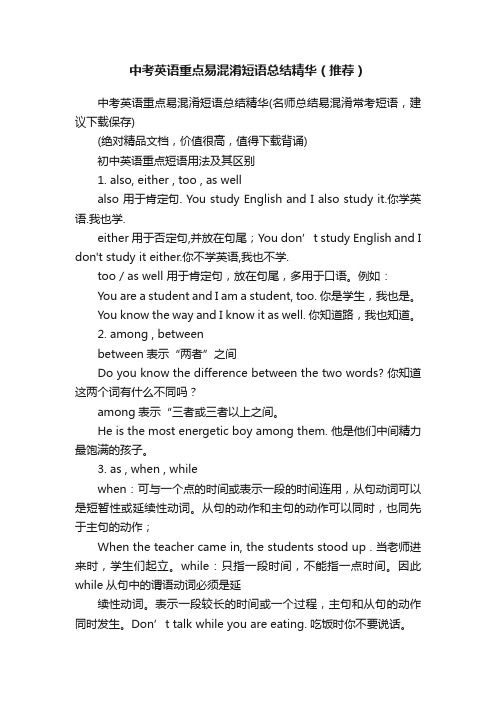
中考英语重点易混淆短语总结精华(推荐)中考英语重点易混淆短语总结精华(名师总结易混淆常考短语,建议下载保存)(绝对精品文档,价值很高,值得下载背诵)初中英语重点短语用法及其区别1. also, either , too , as wellalso 用于肯定句. You study English and I also study it.你学英语.我也学.either 用于否定句,并放在句尾;You don’t study English and I don't study it either.你不学英语,我也不学.too / as well 用于肯定句,放在句尾,多用于口语。
例如:You are a student and I am a student, too. 你是学生,我也是。
You know the way and I know it as well. 你知道路,我也知道。
2. among , betweenbetween表示“两者”之间Do you know the difference between the two words? 你知道这两个词有什么不同吗?among表示“三者或三者以上之间。
He is the most energetic boy among them. 他是他们中间精力最饱满的孩子。
3. as , when , whilewhen:可与一个点的时间或表示一段的时间连用,从句动词可以是短暂性或延续性动词。
从句的动作和主句的动作可以同时,也同先于主句的动作;When the teacher came in, the students stood up . 当老师进来时,学生们起立。
while:只指一段时间,不能指一点时间。
因此while从句中的谓语动词必须是延续性动词。
表示一段较长的时间或一个过程,主句和从句的动作同时发生。
Don’t talk while you are eating. 吃饭时你不要说话。
202X年中考英语78个易混易错单词+短语+句型
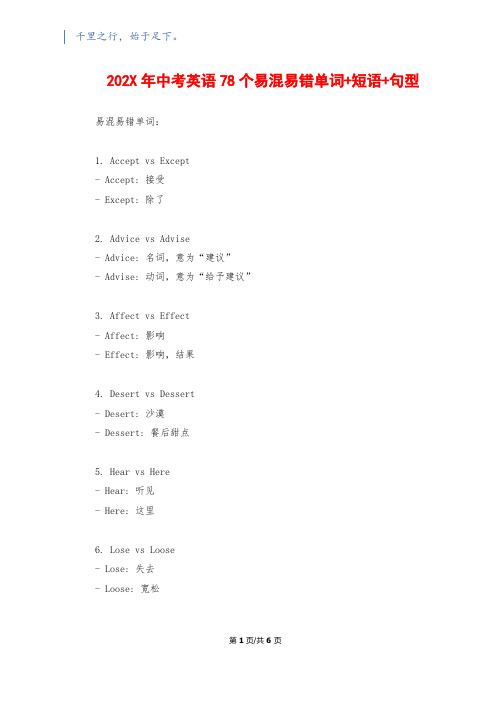
202X年中考英语78个易混易错单词+短语+句型易混易错单词:1. Accept vs Except- Accept: 接受- Except: 除了2. Advice vs Advise- Advice: 名词,意为“建议”- Advise: 动词,意为“给予建议”3. Affect vs Effect- Affect: 影响- Effect: 影响,结果4. Desert vs Dessert- Desert: 沙漠- Dessert: 餐后甜点5. Hear vs Here- Hear: 听见- Here: 这里6. Lose vs Loose- Lose: 失去- Loose: 宽松第1页/共6页7. Weather vs Whether- Weather: 天气- Whether: 是否8. Quiet vs Quite- Quiet: 安静- Quite: 相当9. Principal vs Principle- Principal: 校长- Principle: 原则10. Stationary vs Stationery - Stationary: 静止的- Stationery: 文具11. Than vs Then- Than: 比如- Then: 然后12. Their vs There vs They're - Their: 他们的- There: 那里- They're: they are(他们是)13. Threw vs Through- Threw: 扔- Through: 穿过14. To vs Too- Too: 也,过于15. Its vs It's- Its: 它的- It's: it is(它是)16. Your vs You're- Your: 你的- You're: you are(你是)17. Principal vs Principle- Principal: 校长- Principle: 原则18. Heel vs Heal- Heel: 脚后跟- Heal: 治愈19. Cement vs Concrete- Cement: 水泥- Concrete: 混凝土20. Idle vs Idol- Idle: 闲置的- Idol: 偶像21. Cell vs Sell- Cell: 细胞第3页/共6页22. Fare vs Fair- Fare: 费用- Fair: 公平的23. Foul vs Fowl- Foul: 犯规的- Fowl: 家禽24. Peak vs Peek vs Pique- Peak: 顶峰- Peek: 偷看- Pique: 激怒25. Breath vs Breathe- Breath: 呼吸(名词)- Breathe: 呼吸(动词)易混易错短语:1. By the way vs Anyway- By the way: 顺便问一下- Anyway: 无论如何2. In the meantime vs Meanwhile- In the meantime: 与此同时- Meanwhile: 与此同时3. On the other hand vs On the one hand- On the other hand: 另一方面- On the one hand: 一方面4. It's all Greek to me- 意为“对我来说这都是希腊文”,表示完全听不懂5. Fit as a fiddle- 意为“身体非常健康”6. Break a leg- 意为“祝你好运”7. A piece of cake- 意为“易如反掌”8. Once in a blue moon- 意为“千载难逢”9. Bite the bullet- 意为“咬紧牙关”10. Keep your fingers crossed- 意为“祝你好运”易混易错句型:1. I have been to New York last year.- I went to New York last year.第5页/共6页2. She didn't went to school yesterday.- She didn't go to school yesterday.3. Have you ever been to Paris?- Have you ever been to Paris before?4. I don't know nothing about that.- I don't know anything about that.5. He was tired, so he gone to bed early. - He was tired, so he went to bed early.6. I have lived in this city since 5 years. - I have lived in this city for 5 years.7. I am here for visit my grandparents.- I am here to visit my grandparents.8. We don't have no time for that.- We don't have any time for that.。
人教版九年级英语各单元易混易错词义辨析汇总

Unit1 易混易错词义辨析汇总1、aloud, loud与loudly2、discover与invent3、by, with, in, through与use4、instead与instead ofUnit2 易错易混词义辨析汇总1、dead, die, death与dying2、like, love与enjoy3、bring, carry, fetch与takeUnit3 易混淆单词和短语辨析1、辨析: beside, besides例:The bookstore is on your right, beside the bank.书店在你的右边,银行旁边。
Besides English, we learn Japanese as well.除了英语,我们还学日语。
2、辨析:between, among例:Between the door and the window there is a map. 门和窗户的中间有一张地图。
He sat among the children. 他坐在孩子们中间。
3、辨析:excuse me, sorry, pardon例:Excuse me, may I use your bicycle, Jack?对不起,我可以用一下你的自行车吗,杰克?I’m sorry. I can’t go to the cinema with you this afternoon.对不起。
我今天下午不能和你一起去看电影。
一Answer the question in English.请用英语回答这个问题。
一Pardon?对不起,请再说一遍。
4、辨析:on one’s way to, in a way, by the way, in the way例:I met an old friend of mine on my way to the station.在去车站的途中,我碰见了我的一位老朋友。
人教版九年级全册英语易错单词大汇总及练习(含答案)(背诵版+默写版)

初三英语易错单词大汇总(背诵版)1.except (除了)2.expect (期待)3.expert (专家)4.accept(接受)1.beside(旁边)2.besides (除此之外)1.quiet(安静)2.quite (十分,非常)1.catch-caught (抓住)2.teach-taught (教)1.true—truly (真的的)fortable—comfortably(舒服的)3.terrible---terribly (可怕的)1.polite---politely(有礼貌的) impolite (没礼貌)plete—completely(完全的)1.nine—nineteen(十九)---ninety(九十)----ninth(第九)2.four---fourteen(十四)----forty (四十)1.twelve---twelfth (十二)2.twenty---twentieth (二十)1.garden (花园) 2.pardon (请原谅,再说一遍)e true (实现)2.in the future (在未来)1.desert (沙漠)2.dessert (甜品)1.habit (习惯)2.hobby(兴趣)1.hundred (百)2.thousand (千)lion(百万)4.billion(十亿)1.friend (朋友)2.foreign (外国的)3.field (田野)1.invent(发明)2.invite (邀请)1.dollar (美元)2.similar (相似)3.familiar(相似)1.though = although (尽管)2.through (通过)3.thought(think的过去式)1.throw ---threw---thrown (扔)2.lie----lay----lain(躺,位于)3.lie---lied ---lied(说谎)y ---laid----laid (放,产卵)1.till (直到)2.not-----until(直到-----才)3.unless (除非)1.argue(争吵,动词)---argument(争吵,名词)1.delicious (美味的)2.travel (旅行)3.thief--thieves (小偷)1.one---first (第一)2.three –third (第三)3.girls (女孩)1.mouth(嘴巴)2.month----months (月份)3.mouse—mice (老鼠) 1.plan---planned (双写)2.prefer----preferred (双写)3.stop-stopped(双写)1.eat---eating(不双写)2.rain---raining(不双写)3.wait-waiting(不双写)4.happen----happened 、happening(不双写)5.write-wrote-written(双写)-writing(不双写)1.expensive----inexpensive2.like ---dislike(不喜欢) ----unlike(不像)1.honest---dishonest(不诚实)2.appear---disappear(消失)1. modern (现代化的)2.model(模型)1.medicine (药)2.machine(机器)1.pride (骄傲,名词)2.proud (自豪的,形容词)3.pound (英镑)1.weather (天气)2.whether(是否)1.father(父亲)2.farther (far的比较级,更远的)3.further(进一步,更深入)1.believe (相信)2.receive (收到)1. succeed (成功,动词)-----success(名词)-successful(形容词) 1.before (之前)2.pass (动词通过)3.past(介词,经过一般用于动词后,如:walk past)初三英语易错单词大汇总(默写版)1_________ (除了)2.__________(期待)3. _________(专家)4. _________(接受)1. _________(旁边)2. _________ (除此之外)1. _________(安静)2. _________ (十分,非常)1.catch-_________ 过去式(抓住)2.teach-_________过去式(教)1.true—_________ 副词(真的)fortable—_________(舒服的)3.terrible---_________ (可怕的)1.polite--_________ (有礼貌的) _________ (没礼貌)plete—_________(完全的)1.nine—_________ (十九)-- _________(九十)--_________ (第九)2.four--_________ (十四)-- _________(四十)1.twelve---_________(十二)2.twenty---_________ (二十)1. _________ (花园)2. _________(请原谅,再说一遍)e _________ (实现)2.in the_________ (在未来)1. _________ (沙漠)2. _________(甜品)1. _________ (习惯)2. _________(兴趣)1. _________ (百)2. _________(千)3. _________(百万)4. _________(十亿)1. _________ (朋友)2. _________(外国的)3. _________(田野)1. _________(发明)2. _________(邀请)1. _________(美元)2. _________(相似)3. _________(相似)1. _________ = _________(尽管)2. _________(通过)3. _________(think的过去式)1.throw --________ --________ (扔)2.lie---_______ -______ (躺,位于)3. lie--______ --______(说谎)y --________ --________(放,产卵)1. _________ (直到)2._________(直到-----才)3. _________(除非)1. _________(争吵,动词)---_________争吵,名词)1. _________ (美味的)2. _________ (旅行)3.thief--_________ (小偷)1.one--_________ (第一)2.three –_________ (第三)3. _________(女孩)1. _________ (嘴巴)2.month---_________ (月份)3.mouse—_________ (老鼠)1.plan---_________ 过去式(双写)2.prefer----_________(双写)3.stop-_________(双写)1.eat--_________现在分词(不双写)2.rain---_________(不双写)3.wait-_________(不双写)4.happen----_________、_________(不双写)1.expensive----________(不贵的)2.like --________ (不喜欢) ----________(不像)1.honest---________(不诚实)2.appear---________ (消失)1. ________(现代化的)2. ________(模型)1. ________ (药)2. ________(机器)1. ________(骄傲,名词)2. ________(自豪的,形容词)3. ________(英镑)1. ________(天气)2. ________(是否)1. ________(父亲)2. ________(far的比较级,更远的)3.________(far的比较级,进一步,更深入)1. ________(相信)2. ________(收到)1. ________ (成功,动词)--- ________(名词)-________ (形容词)1. ________(之前)2. ________ (动词通过)3. ________(介词,经过,一般用于动词后,如:______走过)易错首字母强化训练:1.There are many different kinds of flowers in the g_________.2.Our parents t_________ care for us. They always prepare everything what we need in advance.3.I took lots of wonderful photos with my new c__________.4.E__________ is the mother of wisdom.5.A__________speaks louder than words.6.I beg your ________. What do you mean7.There are so many things around us that go against our w________. We should believe in ourselves and keep on fighting.8.You are supposed to fini sh your homework b________ ten o’clock.9.I used to sit b_________ my mother and enjoyed the stories when I was young.10.Mary can speak three f_________ languages, such as Chinese, French, and German.11.I can’t stand the w________ here, it’s so hot and h umid.12.You’d better change your bad eating h__________. Don’t eat too much fat.13.Today is my t____________ birthday. So eleven candles is not enough , I still need one more.14.The thief was c___________ by the police three years later. And put him into the prison.15.Look , the students are w__________ for the bus. The bus was fiveminutes later than usual.16.Please show me the m_______ plane, It’s quite special, I’m really interested in it.17.My grandma began to learn English in her f________---nearly fifty years old.18.I p_________to go Hongkong for my holiday, but now I have changed my mind. I will go to Thailand instead.19.There are f_______ days in two weeks.20.The people who have realized their mistakes should be e________. 参考答案:1.garden2.truly3.camera4.Experience5.Action6.pardon7.will 8.by/before 9.beside 10.foreign 11.weather 12.habit13.twelfth 14.caught 15.waiting 16.model 17.forties 18.planned 19.fourteen 20.excused。
人教版初中英语专项复习之易错常识点归纳
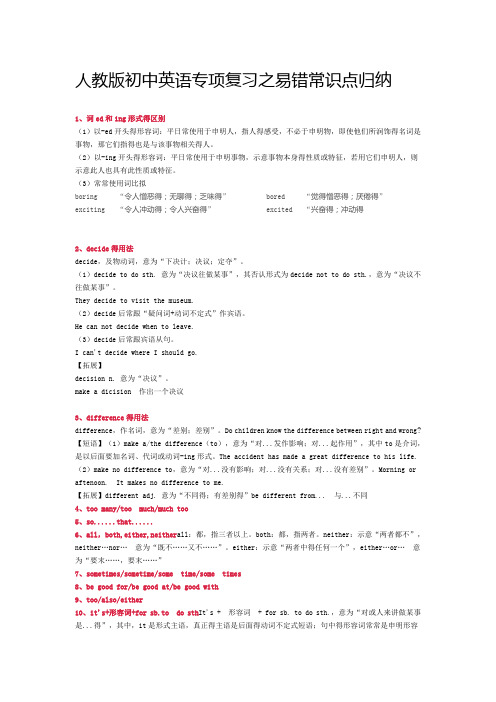
人教版初中英语专项复习之易错常识点归纳1、词ed和ing形式得区别(1)以-ed开头得形容词:平日常使用于申明人,指人得感受,不必于申明物,即使他们所润饰得名词是事物,那它们指得也是与该事物相关得人。
(2)以-ing开头得形容词:平日常使用于申明事物,示意事物本身得性质或特征,若用它们申明人,则示意此人也具有此性质或特征。
(3)常常使用词比拟boring“令人憎恶得;无聊得;乏味得”bored“觉得憎恶得;厌倦得”exciting“令人冲动得;令人兴奋得”excited“兴奋得;冲动得2、decide得用法decide,及物动词,意为“下决计;决议;定夺”。
(1)decide to do sth. 意为“决议往做某事”,其否认形式为decide not to do sth.,意为“决议不往做某事”。
They decide to visit the museum.(2)decide后常跟“疑问词+动词不定式”作宾语。
He can not decide when to leave.(3)decide后常跟宾语从句。
I can't decide where I should go.【拓展】decision n. 意为“决议”。
make a dicision 作出一个决议3、difference得用法difference,作名词,意为“差别;差别”。
Do children know the difference between right and wrong? 【短语】(1)make a/the difference(to),意为“对...发作影响;对...起作用”,其中to是介词,是以后面要加名词、代词或动词-ing形式。
The accident has made a great difference to his life.(2)make no difference to,意为“对...没有影响;对...没有关系;对...没有差别”。
中考常考(重点)易混淆短语辨析汇总(完整版)

中考常考(重点)短语辨析汇总(完整版)1.how long多长时间how soon多久以后how far多远how many多少how much多少;多少钱how often多久一次how old多大2.talk with… 与……交谈talk about… 谈论关于……talk to… 与……交谈talk back回嘴talk over商议talk to oneself自言自语3.think of… 考虑……;认为……think about… 思考……think back回想think up想出,想到think over仔细考虑;认真思考4.turn up调高;出现,露面turn down调低;拒绝turn on打开turn off关闭turn left向左转turn right向右转5.put up搭建,张贴put down放下;镇压put off推迟;拖延put on穿上;增加put up with… 忍受……put aside把……放在一边put away收拾好,放好6.show up出现,露面show off炫耀on show展示7.in need处于需要中,需要in person亲自in danger陷入危险in common共同之处in trouble陷入困境;陷入麻烦in fact事实上in style时髦地in general 总体上8.turn up调高;出现pick up捡起;(无意中)学到;(开车)接某人take up开始从事;占give up放弃make up编造;化妆go up上涨put up搭建,张贴clean up大扫除grow up长大;成长cheer up振奋起来wake up醒过来,弄醒set up建立line up排队stand up站起来stay up熬夜pick up捡起,拾起;无意中学习到;接听look up向上看;查阅cut up切碎mix up混合9.take after… 长得像……take off起飞;脱下;(事业)走红take in吸收;吸入take out取出,拿出take part 拆开take notice注意到take the place of… 取代……take up开始;从事;接纳;占据;继续做take on承担;呈现take over接受;接管;借用;接办take down记下;取下take place发生;进行;举行take a look看一下take a walk散步take away带走,拿走,取走take care of… 照顾……;注意……;抚养……take charge掌管,负责10.g ive up放弃give in投降give away捐赠give off发出give out分发give back归还11.l ook after… 照顾……look for… 寻找……look at… 看一看……look up向上看;查阅look into… 调查……look like… 看起来像……look down向下看,俯视look out当心look through… 浏览……look forward to… 盼望……look up to… 钦佩……;仰慕……look back… 回头看……; 回顾……look down upon (on)… 看不起……,轻视……look on… 旁观……,观望……12.t ake down记下break down突然终止,中断fall down摔倒cut down砍下put down放下;镇压go down下降;下跌calm down平静下来13.k now about… 了解……;知道……talk about… 谈论关于……worry about… 担心……;挂念……care about… 关心……write about… 写关于……argue about… 争论……hear about/of… 听说……14.c lean off清理;清算get off下车take off起飞;脱下;(事业)走红put off推迟,拖延turn off关闭kick off踢掉;开除shut off关闭;暂停go off(闹铃等)响了15.g et up起床get off下车get on上车get along/on with… 与……相处16.t hrow out扔掉go out外出,出去cut out切断come out出来;出版look out当心give out分发clear out清理try out尝试lay out排版;放置work out解决carry out实施,执行put out扑灭find out弄清楚hang out 闲逛check out退房eat out 外出吃饭pull out推出;摆脱17.p lay with… 与……一起玩part with… 放弃……;交出……;卖掉……begin with… 开始……talk with… 与……交谈start with… 开始……deal with… 处理……;应付……agree with… 同意……argue with… 与……争论18.h ang up挂断;结束hang back退缩;拖拉hang off迟疑hang out闲逛19.b low away吹走;驱散put away放好;收拾好throw away扔掉give away赠送20.l ook for… 寻找……pay for… 支付……ask for… 寻求……;索要……21.c ome true实现come over过来come up被提出come in进来come up with… 提出……;想出……come across… 偶遇……come from… 来自……22.c ome from… 来自……hear from… 收到……的来信be from… 来自……23.set out出发;开始;陈述set about sth./doing sth.着手做某事set off动身,出发; 燃放(鞭炮等),使……爆炸或发出响声set up竖起来,支起来;建立,成立set aside 放在一边,搁置;存蓄,留下24.play jokes/a joke on… 戏弄……play a trick/tricks on sb.捉弄某人make fun of… 捉弄……;取笑……make fool of… 愚弄……;戏弄……laugh at… 嘲笑……25.g o out出去go away离开go over复习go off(闹铃)响起26.a bove all最重要;首先after all毕竟;别忘了at all丝毫;根本first of all首先in all总共27.s hut off关闭; 停止运转shut up闭嘴28.a t first首先at least至少at most至多at once立刻,马上at that time在那时at the same time同时29.get in the way of… 挡……的路,妨碍in a way (= in one way/in some ways)从某一角度看;在某种程度上in the way挡路on one’s way (to…) 在去……的路上in no way决不(置于句首,句子要倒装)by the way 顺便问no way没门30.h ave a chance有机会have a cold感冒have the flu患流感have a point有道理,讲得通have to do with… 与……有关31.w ithout doubt 毫无疑问;的确There is no doubt that… 毫无疑问……32.b e proud of… 为……感到自豪take pride in… 为……感到自豪33.c ompare…with…把……与……进行比较compare …to…把……比作……34.b y the way顺便问一下by accident= by chance偶然地by mistake错误地one by one一个接一个step by step一步一步地little by little逐渐地by the time到……为止by oneself独自地shake sb. by the hand和某人握手35.b e good at… 擅长于,通常指在“技能,技巧,学科”等方面擅长be good with… 好,灵巧的,与……相处得好be good to… 对……友好,相当于be friendly to或是be kind tobe good for… 对……有好处36.b e strict with sb.对某人严格要求be strict in sth.在某方面严格要求。
202X年中考英语78个易混易错单词+短语+句型

202X年中考英语78个易混易错单词+短语+句型1.accept/except: 我接受了他的邀请。
(I accepted his invitation.)2. affect/effect: 这种药会对你的身体产生影响。
(This medicinewill have an effect on your body.)3. advice/advise: 我建议你向他请教。
(I advise you to ask him for advice.)4. allowed/able: 他被允许留下来。
(He is allowed to stay.)5. beside/besides: 我坐在他旁边。
(I sat beside him.)6. busy/business: 他正在忙于工作。
(He is busy with his business.)7. choose/choice: 你可以自由选择。
(You can choose freely.)8. complement/compliment: 你的衣服和你的鞋子相互补充。
(Your clothes complement your shoes.)9. confident/confidential: 这是一份机密文件。
(This is a confidential document.)10. could/would: 他可能会来参加我们的聚会。
(He could/would cometo our party.)11. dessert/desert: 我喜欢吃甜点。
(I like eating desserts.)12. disease/illness: 他患有一种严重的疾病。
(He has a serious illness.)13. effect/affect: 污染对环境有影响。
(Pollution has an effect on the environment.)14. fact/fact: 事实上,我并不了解这个问题。
2021年初中英语人教版易混易错词汇辨析
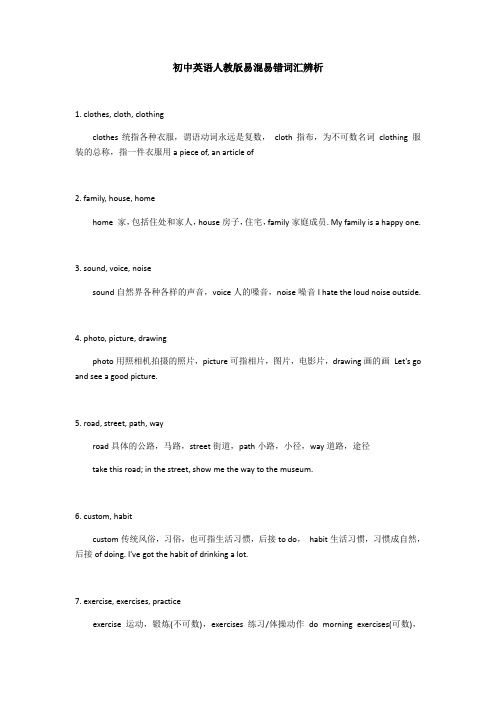
初中英语人教版易混易错词汇辨析1. clothes, cloth, clothingclothes统指各种衣服,谓语动词永远是复数,cloth指布,为不可数名词clothing 服装的总称,指一件衣服用a piece of, an article of2. family, house, homehome 家,包括住处和家人,house房子,住宅,family家庭成员. My family is a happy one.3. sound, voice, noisesound自然界各种各样的声音,voice人的嗓音,noise噪音I hate the loud noise outside.4. photo, picture, drawingphoto用照相机拍摄的照片,picture可指相片,图片,电影片,drawing画的画Let's go and see a good picture.5. road, street, path, wayroad具体的公路,马路,street街道,path小路,小径,way道路,途径take this road; in the street, show me the way to the museum.6. custom, habitcustom传统风俗,习俗,也可指生活习惯,后接to do,habit生活习惯,习惯成自然,后接of doing. I've got the habit of drinking a lot.7. exercise, exercises, practiceexercise运动,锻炼(不可数),exercises练习/体操动作do morning exercises(可数),practice(反复做的)练习Practice makes perfect.8. class, lesson作"课"解时,两者可以替换.指课文用lesson. 指班级或全体学生用class. lesson 6; class 59. speech, talk, lecturespeech指在公共场所所做的经过准备的较正式的演说,talk日常生活中的一般的谈话,讲话,lecture学术性的演讲,讲课 a series of lecture on…10. officer, officialofficer部队的军官,official政府官员an army officer11.work, job 二者均指工作。
中考英语:2022-2023学年人教版英语易错点归纳(Unit1)

中考英语:2022-2023学年人教版英语易错点归纳(Unit1)1. mistake用法归纳make a mistake =make mistakes 犯错误by mistake 由于误会,错误地mistake … for …“错把…当作…”2. pay attention to的用法pay attention to 虽然以to结尾,其后却不能跟动词原形,而应该用动名词形式.有类似用法的短语还有:be used to“习惯于”;look forward to“期待”.3. by/with/in的辨析by 表示“以·...方式(方法、手段)”或“乘坐某种交通工具”with 指“借助于某种具体的工具或物品”in 表示“以某种材料或原料”,还可以表示“用某种语言”4. discover, invent, create的辨析discover 指“发现”某种本来存在而以前未被发现的事物或未为人所知的东西invent 指“发明”,即原来没有而后来发明创造出来create 意为“创造;创作”,指创造出新的东西,其对象往往是精神上的,如艺术、文学作品中的人物及新的科学领域等;还可以表示创造出新的事物或机会等5. watch/read/see/look at 的辨析(1)看电视、看比赛、看表演用watch;(2)看书、看报、看杂志用read(3)看电影、看医生用see(4) 看黑板、看地图用look at6. learn用法归纳(1) learn from sb. 向某人学习(2)learn to do sth 学着做某事(3)learn…by oneself= teach oneself 自学7. find用法归纳find→ found →found v寻找(1) find sb. doing sth 发现某人做某事(2) find it + adj. + to do sth 发现做某事很……findit difficult/ hard to do sth 发现做某事很困难8. sure用法归纳sure adj. 确信的be sure about 确信 make sure 确保(1) be sure +about / of +名词、代词或动名词对……有把握(2) be sure to do sth 务必;确信(3) be sure +that 从句(4) make sure + that 从句make sure to do sth 务必干……make sure of sb./ sth 弄清楚某人/事9. sound/noise/voice的辨析(1)voice多指人说话、唱歌、鸟的叫声。
人教版中考英语核心词汇重点易错点整理
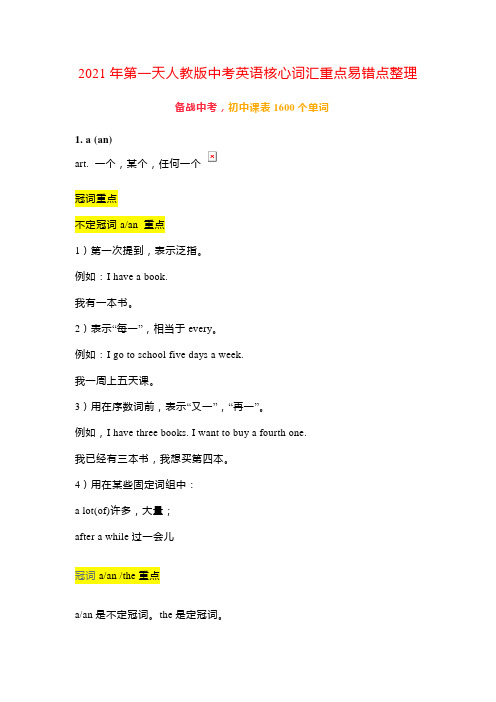
2021年第一天人教版中考英语核心词汇重点易错点整理备战中考,初中课表1600个单词1. a (an)art. 一个,某个,任何一个冠词重点不定冠词a/an 重点1)第一次提到,表示泛指。
例如:I have a book.我有一本书。
2)表示“每一”,相当于every。
例如:I go to school five days a week.我一周上五天课。
3)用在序数词前,表示“又一”,“再一”。
例如,I have three books. I want to buy a fourth one.我已经有三本书,我想买第四本。
4)用在某些固定词组中:a lot(of)许多,大量;after a while过一会儿冠词a/an /the重点a/an是不定冠词。
the是定冠词。
下面是定冠词用法特指某(些)人或某(些)物,这是定冠词的基本用法。
例如:I have a book. The book is red.我有一本书,这本书是红色的。
指谈话双方都知道的人或事物。
例如:Open the window,please.请打开窗户。
指上文已经提到的人或事物。
例如:I have a car. The car is red.我有一辆小汽车,它是红色的。
指世界上独一无二的事物。
例如:Which is bigger,the sun or the earth?哪一个大,太阳还是地球?用在序数词,形容词最高级前。
例如:The first lesson is the easiest one in this book.第一课是这本书最简单的一课。
用在由普通名词构成的专有名词前。
例如:the great wall 长城,the united states美国用在某些形容词前,表示某一类人。
例如:the poor穷人the blind盲人用在姓氏复数形式前,表示“全家人”或“夫妻俩”。
例如:the greens格林一家或格林夫妻用在方位词前。
中考英语易混淆词汇总结
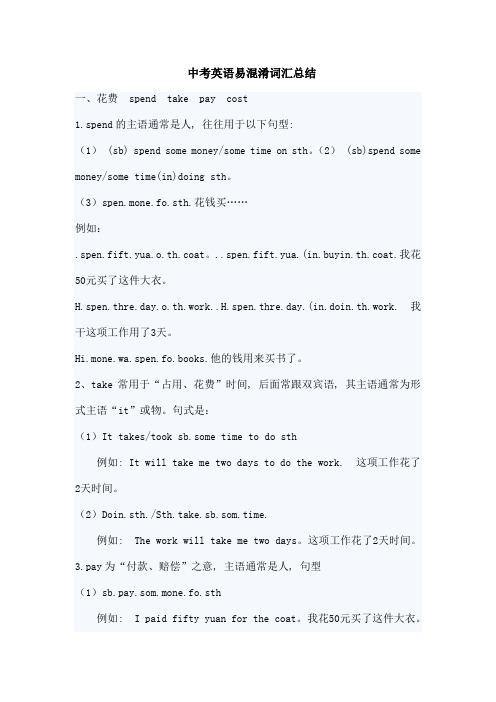
中考英语易混淆词汇总结一、花费 spend take pay cost1.spend的主语通常是人, 往往用于以下句型:(1) (sb) spend some money/some time on sth。
(2) (sb)spend some money/some time(in)doing sth。
(3)spen.mone.fo.sth.花钱买……例如:.spen.fift.yua.o.th.coat。
..spen.fift.yua.(in.buyin.th.coat.我花50元买了这件大衣。
H.spen.thre.day.o.th.work..H.spen.thre.day.(in.doin.th.work.我干这项工作用了3天。
Hi.mone.wa.spen.fo.books.他的钱用来买书了。
2、take常用于“占用、花费”时间, 后面常跟双宾语, 其主语通常为形式主语“it”或物。
句式是:(1)It takes/took sb.some time to do sth例如: It will take me two days to do the work. 这项工作花了2天时间。
(2)Doin.sth./Sth.take.sb.som.time.例如: The work will take me two days。
这项工作花了2天时间。
3.pay为“付款、赔偿”之意, 主语通常是人, 句型(1)sb.pay.som.mone.fo.sth例如: I paid fifty yuan for the coat。
我花50元买了这件大衣。
(2)pa.(sb..mone.fo.sth.付钱(给某人)买……。
例如:.hav.t.pa.the.2.pound.fo.thi.roo.eac.month.我每个月要付20英磅的房租。
(3)pay money back 还钱。
(4)例如: Ma..borro.1.yua.fro.yo.I'l.pa.i.bac.nex.week.你能借给我12块钱吗?下周还你。
中考初中英语总复习易错题易错点易混点集锦大全精选(珍藏版)精编版
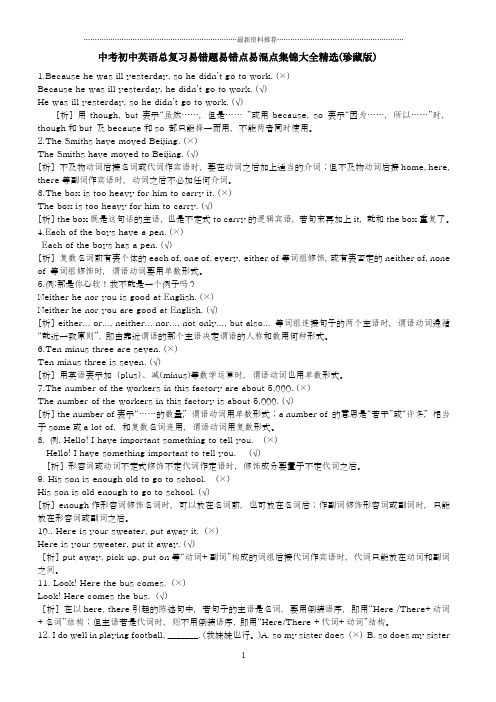
中考初中英语总复习易错题易错点易混点集锦大全精选(珍藏版)1.Because he was ill yesterday, so he didn’t go to work. (×)Because he was ill yesterday, he didn’t go to work. (√)He was ill yesterday, so he didn’t go to work. (√)[析] 用though, but表示“虽然……,但是……”或用because, so 表示“因为……,所以……”时,though和but 及because和so 都只能择一而用,不能两者同时使用。
2.The Smiths have moved Beijing. (×)The Smiths have moved to Beijing. (√)[析] 不及物动词后接名词或代词作宾语时,要在动词之后加上适当的介词;但不及物动词后接home, here, there等副词作宾语时,动词之后不必加任何介词。
3.The box is too heavy for him to carry it. (×)The box is too heavy for him to carry. (√)[析] the box既是这句话的主语, 也是不定式to carry的逻辑宾语,若句末再加上it,就和the box重复了。
4.Each of the boys have a pen. (×)Each of the boys has a pen. (√)[析] 复数名词前有表个体的each of, one of, every,either of等词组修饰,或有表否定的neither of, none of 等词组修饰时,谓语动词要用单数形式。
5.例:那是你心软!我不就是一个例子吗?Neither he nor you is good at English. (×)Neither he nor you are good at English. (√)[析] either... or..., neither... nor..., not only..., but also... 等词组连接句子的两个主语时,谓语动词遵循“就近一致原则”, 即由靠近谓语的那个主语决定谓语的人称和数用何种形式。
九年级常考的易混淆词汇,短语及句型辨析汇总(一)
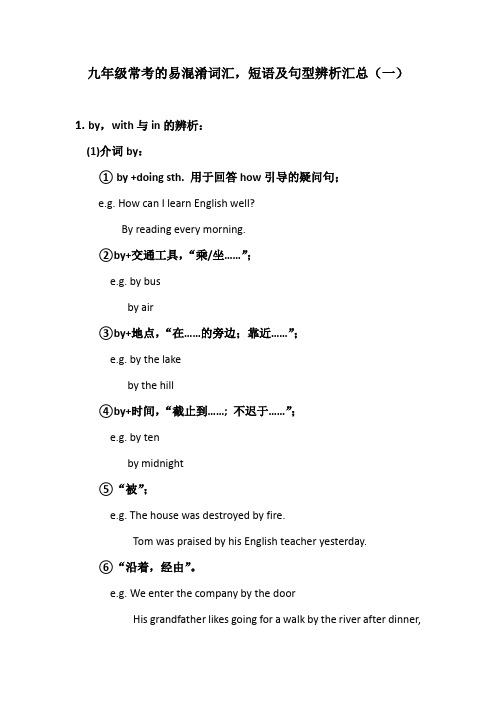
九年级常考的易混淆词汇,短语及句型辨析汇总(一)1. by,with与in的辨析:(1)介词by:① by +doing sth. 用于回答how引导的疑问句;e.g. How can I learn English well?By reading every morning.②by+交通工具,“乘/坐……”;e.g. by busby air③by+地点,“在……的旁边;靠近……”;e.g. by the lakeby the hill④by+时间,“截止到……; 不迟于……”;e.g. by tenby midnight⑤“被”;e.g. The house was destroyed by fire.Tom was praised by his English teacher yesterday.⑥“沿着,经由”。
e.g. We enter the company by the doorHis grandfather likes going for a walk by the river after dinner,⑦常用的短语:by the way 顺便问一下by accident= by chance 偶然地by mistake 错误地one by one 一个接一个step by step 一步一步地little by little 逐渐地by the time 到……为止by oneself 独自地shake sb. by the hand 和某人握手(2)with的用法:表示用某种工具。
with +工具;with+人体部位。
e.g. We like to write with a pen.We see with our eyes.(3) in的用法:通常与“语言、衣着、声音、书写材料”等名称连用。
e.g. in English用英语in ink用墨水speak in a loud voice大声地讲in red 穿红色的衣服2. so/ such…that… 的用法辨析:(1)“如此……以至于……”,引导的结果状语从句句型有:①so +形容词/副词+that 从句;②so+形容词+ a / an +单数名词+that 从句;③such+ a / an + (形容词)+单数名词+that 从句;④such +(形容词)+复数名词/ 不可数名词+ that从句。
- 1、下载文档前请自行甄别文档内容的完整性,平台不提供额外的编辑、内容补充、找答案等附加服务。
- 2、"仅部分预览"的文档,不可在线预览部分如存在完整性等问题,可反馈申请退款(可完整预览的文档不适用该条件!)。
- 3、如文档侵犯您的权益,请联系客服反馈,我们会尽快为您处理(人工客服工作时间:9:00-18:30)。
人教部编版初中英语中考78个易混易错单词短语句型梳理一、英语常用易混淆单词/词组的区别用法how much和how many的区别用法how much和how many的区别:how much用来询问事物的数量,后接不可数名词;how many用来询问事物的数量,后接可数名词复数。
1.所修饰词不同how much用来修饰不可数名词,表示数量,也可单独使用。
how many用来修饰可数名词的复数,它的句式是:How many+复数名词+一般疑问句+?例句:How much milk is there in the glass?玻璃杯里有多少牛奶?How many books are there on the desk?有多少本书在桌子上?2.用法不同How much 表示多少钱,用来问价格。
例句:How much is this dress?这个连衣裙多少钱?How many 表示多少,用来问数量。
例句:How many apples do you have?你有多少苹果?in和on的区别用法当我们表示某些东西被其他东西所包围时使用“in”这个词。
而“on”用于描述物体被放置在其他物体上方或外部的情况。
in可表时间,表地点,表手段、方法、材料。
on表示时间、地点、方位等。
1.意思不同in:prep.在 ... 里;在 ... 地方;在 ... 期间on:prep.在 ... 之上2.用法不同in:in着重一段时间的过程,常用于重复动作或延续动作。
in表示从现在时间算起推移到将来的一段时间之后,一般与将来时态连用。
例句:He is a layman in economics.他对经济学一窍不通。
on:表示“在物体的表面上”,只能用on的表达方式有on the next morning,on the following。
例句:The spider is walking on the ceiling.蜘蛛在天花板上爬行。
3.侧重点不同in:表示“在其中”。
on:表示“在表面”。
if和whether的区别用法if和whether的区别:if和whether在宾语从句中,都,可换用,if更口语化,whether正式些。
当有or not 表“是否”时,一般用whether,而不用if。
1.or not放在whether之后时,只能用whether不用if。
例句:I don’t know whether or not he will come.我不知道他是不是回来。
注:如果or not放在whether所引导的从句句尾,则可以用if来替换。
I don’t know whether/if he will come or not.我不知道他是不是回来。
2.在强调任意选择时,用whether…or,此时不用if替换whether。
例句:He asked me whether I wanted to go there by train orby bus.他问我是想乘火车还是坐公共汽车去那里。
注:whether和or一起还有“不管”之意,引导让步状语从句。
Whether he drives or takes the train, he will be here on time.不管开车来还是乘火车来,他都会准时到。
3.虽引导宾语从句,但为了强调宾语部分,也可把从句放在句首,此时只用whether不用if。
例句:Whether he will come I am not sure.他是不是来我拿不准。
4.从句作介词宾语时只用whether不用if。
例句:It depends on whether it will be fine.那得看是不是晴天。
5.作discuss等动词的宾语时,用whether不用if。
例句:We discussed whether we should close the shop.我们讨论是不是该关掉商店。
6.句子中有if引导的条件句,如再有表示“是否”的宾语从句,用whether不用if。
例句:He asked me whether I’d move to New York if I got the job.他问我如果我得到那份工作是否会搬家到纽约。
7.容易产生歧义时用whether不用if来表示“是否”。
例句:Please let me know if you need help.如果你需要帮助请告诉我。
8.如果宾语从句为否定句时,则只用if不用whether。
例句:I don’t know if it won't rain tomorrow..我不知道明天是不是会下雨。
or和and的区别用法并列结构中,or通常用于否定句,and用于肯定句。
但有时and也可用于否定句。
or用于连接并列的单词、词组、短语或句子,表示"或者"的意思。
or用在选择疑问句中,灵活译为"还是"。
1.or和and有什么区别(1)并列结构中,and用于肯定句,or通常用于否定句表示“和,与”之意。
Sue and I left early.我和苏早离开了。
He can't read or write.他不会读,不会写。
(2)or用在选择疑问句中,意为“或者,还是”。
and不可用于疑问句。
Are you coming or not?你来还是不来?Is your sister older or younger than you?你的姐妹比你大还是小?(3)固定搭配不同or在句型“祈使句+or+陈述句”中,表示在以祈使句为条件下的相反假设,or意为“否则,要不然”。
either…or意思为"或者……或者……"。
注意谓语动词的主谓一致采用就近原则。
2.and和or用法例句(1)并列结构中,and用于肯定句,or通常用于否定句表示“和,与”之意。
There are some students and teachers on the playground.(2)or用在选择疑问句中,意为“或者,还是”。
Is he a doctor or a teacher? 他是医生还是教师?(3)or在句型“祈使句+or+陈述句”中,表示在以祈使句为条件下的相反假设,or意为“否则,要不然”。
Work hard,or you will fall behind.你要努力学习,否则会落后。
(4)either…or意思为"或者……或者……"。
注意谓语动词的主谓一致采用就近原则。
Either you or I am right. 不是你对,就是我对。
(5)or在“either…or…”结构中,意为“要么……要么……”。
连结的并列成份可在句中作主语、表语、谓语、宾语等。
(6)or表示不确切、模糊的陈述。
This story happened five or six years ago. 这个故事发生在四、五年前。
some和any的区别用法some和any的区别:肯定句中用some,否定/疑问要用any换some和any的用法1.some和any都表示一些,两者既可以修饰可数名词又可以修饰不可数名词。
前者用于肯定陈述及委婉请求,后者用于否定句及一般疑问句。
例句:I have some books.I don't have any books.Would you like some coffee?Is there any coffee in your cup?2.在表示建议,反问,请求的疑问句中,或期望得到肯定回答时,多用some而不用any。
例句:Would you like some coffee?What about some fruit juice?3.当说话人认为对方的答复将是肯定的时候,some便可用于疑问句。
例句:Didn't you give him some ticket4.当any表示“任何”的意思,起强调作用时,它可以用在肯定句中。
例句:Any student can answer this question.5.any可以和not以外其他有否定含义的词连用,表达否定的概念。
例句:He never had any regular schooling.I can answer your question without any hesitation.offer与provide的区别用法offer:主动提供;重点在于主动;offer to do:主动做某事。
搭配:offer sb. sth./ offer sth. to sb.provide:大批量地提供。
搭配:provide sth. for sb./ provide sb. with sth.。
